|
|
|
Sort Order |
|
|
|
Items / Page
|
|
|
|
|
|
|
| Srl | Item |
| 1 |
ID:
181251
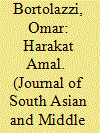

|
|
|
| 2 |
ID:
119480
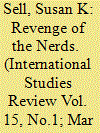

|
|
|
|
|
| Publication |
2013.
|
| Summary/Abstract |
For the first time in thirty years of ever stronger intellectual property policies, a transnational coalition of Internet users was able to kill two US anti-piracy bills that were backed by some of the most politically connected and economically powerful interests in US politics. Combining insights from the literatures on social movements, networks, and Internet activism, I analyze the structure for social mobilization, the form of the coalition, the role of framing, and the use of technology contributing to its success. The literature on social movements and contentious politics addresses situations of threats or grievances that lead actors to mobilize for collective action. In this case, Goliath's latest gambit to ratchet up intellectual property standards threatened David's use of the Internet. This time David beat Goliath.
|
|
|
|
|
|
|
|
|
|
|
|
|
|
|
|
| 3 |
ID:
124606
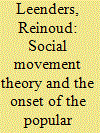

|
|
|
|
|
| Publication |
2013.
|
| Summary/Abstract |
This article takes stock of my attempt to scrutinize the onset of the Syrian uprising with the help of some key analytical concepts derived from social movement theory, including "opportunity" and "threat," "social networks," "repertoires of contention," "framing," and "diffusion." These tools allow me to identify and disentangle the mechanisms of early mobilization and the uprising and explain why they commenced in relatively peripheral areas. Social networks and framing processes are argued to have been key in mobilization, by transmitting opportunities derived from the "Arab Spring," by mediating the nexus between repression and mobilization, by creating and feeding a rich new repertoire of defiant protest acts and claims-making, and by aiding the diffusion or agglomeration of mobilization throughout the country.
|
|
|
|
|
|
|
|
|
|
|
|
|
|
|
|
| 4 |
ID:
125135
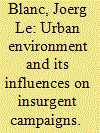

|
|
|
|
|
| Publication |
2013.
|
| Summary/Abstract |
For a long time, insurgency was a rural affair. The growing modernization of the modern world, however, shifts conflicts to the cities and requires us to explore the logics of armed struggle in urban environments. This article explores how the urban environment shapes armed conflicts, and argues that insurgents face severe practical constraints when acting in the cities. The urban environment offers the insurgents alternative ways of financing and of operating while close state control impedes them in pursuing a classic strategy of insurgency. Although state control cannot prevent attacks as such, it particularly hampers insurgents in relating to the population and organizing opposition. However, without massive and active support, armed struggle will remain sectarian and, thus, fail to achieve major political changes. This article argues that urban insurgents face a paradoxical relationship with society. While urban insurgents become independent of social support on an operational level, they depend more than ever on spontaneous massive and active social support on a strategic level.
|
|
|
|
|
|
|
|
|
|
|
|
|
|
|
|
| 5 |
ID:
108184
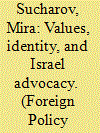

|
|
|
|
|
| Publication |
2011.
|
| Summary/Abstract |
What do we care about-or pretend to care about-when we try to sway hearts and minds through political action? The question of values and value trade-offs in International Relations is understudied. By examining Diaspora-based Israel advocacy (the set of political and educational activities at the school, campus, community and formal political levels designed to increase support by Diaspora Jews, their co-citizens, and their governments for Israel), this paper interrogates the idea of "Jewish values," and theorizes about how actors negotiate among sentiment, aspiration, and values. The evidence suggests that Jews are more likely to invoke "Jewish values" when engaging in in-group critique, whereas Israel advocates are more likely to draw on universal values to defend Israeli goals and actions to others. The essay identifies five value clusters that appear to structure Israel advocacy activities: nationalism and sovereignty, democracy, science, history, and peace, identifies some potential value conflicts that may result, and raises questions about the strategic use of values in social mobilization.
|
|
|
|
|
|
|
|
|
|
|
|
|
|
|
|
|
|
|
|
|